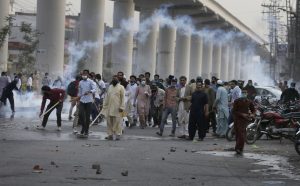A couple of months ago, the Pakistan Tehreek-e-Insaf (PTI) completed three years in government. Its fourth year at the helm is unlikely to be easy as it is under pressure from the main opposition parties, religious groups, political allies and importantly, the military establishment.
Indeed, Pakistan’s capital, Islamabad, is bursting with all sorts of speculations and rumors. Many believe that the PTI government may not complete its full five-year term in office.
The PTI government’s inability to stabilize the economy appears to be the biggest threat to its survival. According to a recent report, inflation in Pakistan has broken a 70-year record in the PTI’s three years in power, with prices of essentials commodities doubling in many cases.
The PTI government is currently trying to negotiate a $6-billion loan package with the International Monetary Fund (IMF). While Pakistan needs the IMF money to stabilize its economy, economists are worried that conditions imposed by the IMF will lead to a new wave of inflation and a hike in prices that will burden consumers.
Prime Minister Imran Khan’s popularity has nosedived and all available reports indicate that if elections were to be held today, the PTI wouldn’t be able to return to power.
The looming threat of further price hikes of essential commodities, the decreasing value of the Pakistani rupee and people’s declining purchasing power have given the opposition, which has been trying to find a suitable peg to target the current government, a chance to rally the public against the Khan government.
Last week, the Pakistan Democratic Movement (PDM) kicked off its 15-day nationwide protest against the continuous rise of prices for petroleum products and food items. In the initial phase, the PDM decided to stage protests in big cities of Pakistan. After the protests, the group will make a decision about holding a long march toward the capital.
The PTI government has also come under pressure from its political allies. Last week, Baluchistan province’s Chief Minister Jam Kamal Khan resigned from the post and accused PTI’s lawmakers of undermining his government. In a Twitter message on October 24, Kamal called on the prime minister to tell his federal colleagues to “not fiddle with Baluchistan internal matters. “They should give space to PTI provincial hierarchy to play its responsibility and role,” he tweeted.
Currently, Baluchistan doesn’t have a chief minister and the province’s multiparty government is in tatters.
Similarly, in Punjab, where the banned Tehreek-e-Labbaik Pakistan (TLP) has been staging protests for the last several days, the PTI’s provincial government has failed to clear the streets of the protestors. Instead, the party has demanded that the government should shut down the French Embassy over the issue of blasphemous caricatures of Prophet Muhammad. The TLP has given the government November 2 as the new deadline by when it should shut down the French embassy in Pakistan. The religious extremists have warned the government of serious consequences if it failed to fulfill its demands.
It is important to emphasize here that the TLP is a banned group in Pakistan and many of its leaders remain jailed under terrorism charges. The situation doesn’t bode well for Khan’s government as looming tensions with the TLP could very well get out of control in the coming days.
The challenge posed by the TLP protests could not have come at a worse time for the prime minister. For weeks now, the prime minister and the military leadership have locked horns over the appointment of the Director General (DG) of the Inter-Services Intelligence (ISI), Pakistan’s premier intelligence agency. While the appointment has been made, it remains unclear if the military leadership would still want to offer its full support to the PTI government in managing domestic politics, including opposition parties and groups like the TLP.
It is intriguing how the TLP suddenly decided to come on to the streets with a demand that is near impossible for the government to fulfill.
The military may not have overtly said anything to Khan over the DG ISI’s appointment but it would be a folly for anyone to think that the security establish is going to forgot this clash with the prime minister any time soon.
When Khan becomes a liability for the security establishment, events like the TLP’s protests could become a daily occurrence.
These tensions are ballooning into major challenges for the ruling party. It is unclear how the PTI government can come out unscathed from these crises.
Pakistan’s ruling party can expect a tough period of multiple challenges and crises in the months ahead.

































